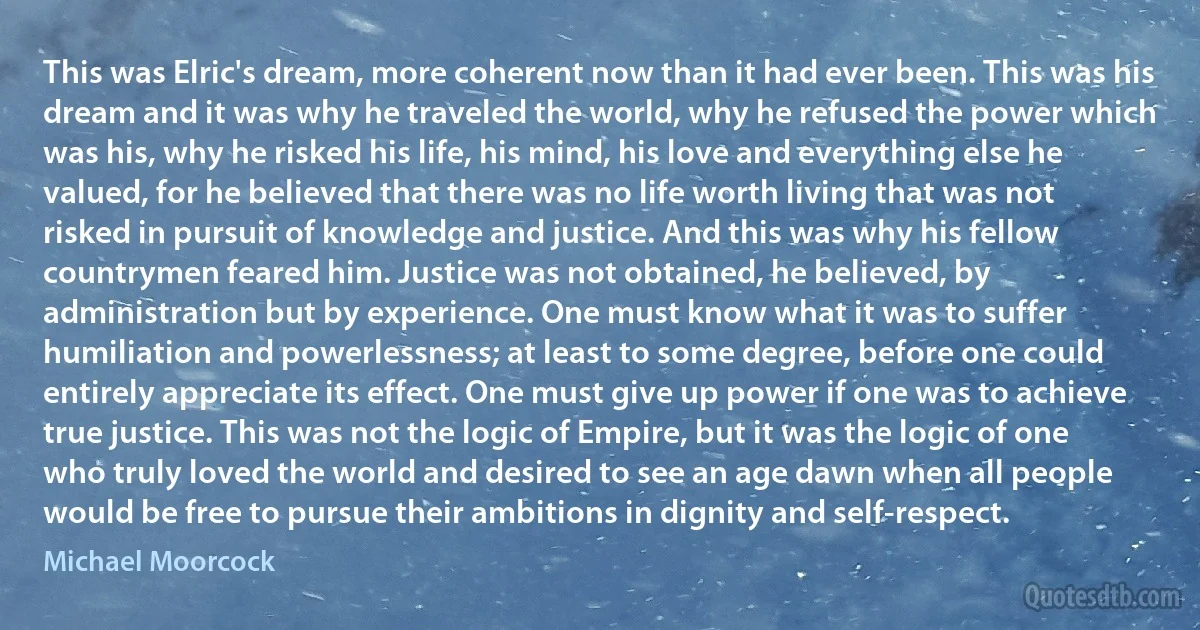
This was Elric's dream, more coherent now than it had ever been. This was his dream and it was why he traveled the world, why he refused the power which was his, why he risked his life, his mind, his love and everything else he valued, for he believed that there was no life worth living that was not risked in pursuit of knowledge and justice. And this was why his fellow countrymen feared him. Justice was not obtained, he believed, by administration but by experience. One must know what it was to suffer humiliation and powerlessness; at least to some degree, before one could entirely appreciate its effect. One must give up power if one was to achieve true justice. This was not the logic of Empire, but it was the logic of one who truly loved the world and desired to see an age dawn when all people would be free to pursue their ambitions in dignity and self-respect.
Michael MoorcockRelated topics
administration age dawn degree dignity dream everything experience fellow free humiliation justice knowledge life living love mind now people power see world worth powerlessnessRelated quotes
Take a moment to remember the times on your own spiritual quest when you felt most enthusiastic. We want to pinpoint the times in which we felt more God conscious and devotional than ever before. Conversely, look at the times when you felt unenthused and do a similar analysis. These questions might help stimulate your thought process: Are you enthusiastic about your existence as a servant of the Lord? Are you enthusiastic to follow the basic principles that will help elevate your consciousness? Are you enthusiastic in the association of saintly people? Are you enthusiastic about what you can experience in your purest state? We must examine our spiritual life on a daily, weekly, and even yearly basis. This examination will help us recognize how various activities and thoughts affect us. We should note how the quality of our experiences varies according to our absorption in the process of bhakti.

Bhakti Tirtha Swami
If Christ were to walk in this world today, do you know what would happen to Him? He would be placed in a mental institution and given psycho-therapy, just as would His Saints. The world would crucify Him today just as it did 2000 years ago, for the world has not learned a thing, except more devious forms of hypocrisy. And what would happen if, in one of my classes at the university, I would one day tell my students that all the learning of this world is of no importance beside the duty of worshipping God, accepting the God-man who died for our sins, and preparing for the life of the world to come? They would probably laugh at me, and the university officials, if they found out, would fire me-for it is against the law to preach the Truth in our universities. We say that we live in a Christian society, but we do not: we live in a society.

Seraphim Rose
Let us abandon the obsolete division of rights into artificial categories of first, second and third generation rights – with their intrinsic prejudices. Let us consider redefining human rights in functional terms. I am suggesting a functional paradigm of enabling rights (such as the rights to peace, food, health and homeland), inherent rights (such as equality and non-discrimination), procedural rights (such as access to information, freedom of expression and due process) and what I would call outcome rights, that is, the practical realization of human dignity in the form of the right to our identity, to achieve our potential and to be just who we are, free to enjoy our own culture and opinions. The absence of this outcome right to dignity and self-respect is reflected in much of the strife we see in the world today.

Alfred de Zayas
I wonder, by my troth, what thou and I
Did, till we loved? Were we not weaned till then?
But sucked on country pleasures, childishly?
Or snorted we in the Seven Sleepers' den?
'Twas so; but this, all pleasures fancies be.
If ever any beauty I did see,
Which I desired, and got, 'twas but a dream of thee.
And now good-morrow to our waking souls,
Which watch not one another out of fear;
For love, all love of other sights controls,
And makes one little room an everywhere.
Let sea-discoverers to new worlds have gone,
Let maps to other, worlds on worlds have shown,
Let us possess one world, each hath one, and is one.
My face in thine eye, thine in mine appears,
And true plain hearts do in the faces rest;
Where can we find two better hemispheres,
Without sharp north, without declining west?
Whatever dies, was not mixed equally;
If our two loves be one, or, thou and I
Love so alike, that none do slacken, none can die.

John Donne
He loved his profession, he had a real sense of dedication to the administration of justice, he held his head high as a lawyer, he rendered and exacted courtesy, honor and straightforwardness at the Bar. He respected the judicial office deeply, demanded the highest standards of competence and disinterestedness and dignity, despised all political use of or trifling with judicial power, and had an affectionate regard for every man who filled the exacting prescription of the just judge. The law to him was like a religion, and its practice was more than a means of support; it was a mission. He was not always popular in his community, but he was respected. Unpopular minorities and individuals often found in him their only mediator and advocate. He was too independent to court the populace - he thought of himself as a leader and lawgiver, not a mouthpiece.

Robert H. Jackson
